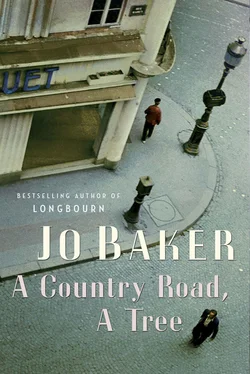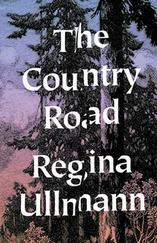He blunders through to breakfast and Madame has the morning bulletin on. He sips ersatz coffee and stares over Suzanne’s shoulder at the dreadful green wallpaper, and Suzanne stares across the room, over her cup, around the people gathered there; they fall silent and they listen. They learn that they are no longer in the Zone Libre: that this has become the Zone Sud. The Axis powers have extended military administration below the demarcation line. The wire has been rolled out round the whole of France. They are all now chickens in a coop, the lot of them.
Suzanne’s sharp eyes slip to his and catch. He sets his cup down, reaches out to her, but she doesn’t take his hand.
“Chances are they won’t come here,” she says.
It is a flimsy enough chance. In the dining room, the guests remain quiet. Madame plods over to the radio set and switches it off sharply, as if it were itself responsible.
“Everyone’s in the same boat,” Suzanne says. “It’s just a question of waiting. The war can’t go on for ever.”
He nods. He thinks, it doesn’t have to. “Well,” he says. “I have to get to work.”
—
There is frost on the ground. His toes are numb in his stupid boots. He walks the long lane down to the vineyard.
The vines are bare, the leaves fallen. The lad, Fernand, is half his age, and is showing him the ropes. The light makes him squint; it is too much. Van Gogh’s paintings: those dim muddy northern scenes, the industrial dirt and misery; but then he’s bowled over by the southern light, by these sun-saturated yellows, by this exact blue. Art is such a consolation. If he himself could paint — but he cannot paint. He turns the collar up on his coat: the faint whiff of it even now, cheroots and lemon. He is marching down the vineyards with a half-bushel basket, a roll of twine, a knife, wearing a dead man’s coat, while the German Army snakes out along the lanes and trackways like poison in the blood, and he daydreams about Van Gogh, and makes nothing happen.
“Come, let me show you,” says the boy. “You must pay close attention, the knife is sharp.”
The lad is vouvoyer ing him, being well brought up: the state he’s in, he has hardly earned the formal mode. At the foot of the slope they step in between the rows of vines. Fernand bends, his young fingers feeling through the splayed, sinewy growth.
“Now watch.”
He takes out a stubby, vicious little knife, the steel blade scraped and scored with striations from the whetstone. He makes a swift sloping cut. He lifts away a horizontal arm of vine, dumps it into his basket.
“These ones here, they fruited this summer. They have to go.” He cuts again, lobs aside another sinewy growth.
“Right.”
The lad scrolls out a length of twine, bends the remaining shoots down to the supporting wires and ties them off.
“Like this,” he says, “One left, one right, spread just so. You understand?”
“I think so.”
The boy smiles. His teeth are white against his tanned skin. It is one of those faces that will be deep in wrinkles by the time he’s thirty. He returns to the work and with three deft cuts he finishes the vine, one to the left shoot, one to the right. “On the central shoot, count three strong buds, then cut.”
He leaves the vine standing like the Cooldrinagh roses in the autumn: neat, abrupt, having been shown who’s boss.
“Now, you — this one here. I’ll watch.”
The palm-worn haft in his right hand, he reaches into the vine and grips the summer’s growth. He copies Fernand’s sharp angled cut. The boy nods approvingly.
He ties the stems down, clips them back, cuts away the central shoot.
“Good. If you need me, I shall be off along the next row, over there.”
He gets to work. He bends, cuts, ties, straightens, dumps the waste aside. He bends, cuts, ties, straightens, dumps the waste aside. He unbuttons the coat. Later, he takes it off entirely and lobs it on to the grass and it lies forgotten.
The rhythm of the work loosens his thoughts; they begin to shift and slide. He’s no longer where he is; time passes differently: an empty train station, the rub of a blistered heel, and the evening soft, and someone watching and someone being watched. And while he drifts with these thoughts, the blade slips and sheers aside, and instead of grapevine he slices deep into the ball of his thumb.
There is a moment’s pause between the damage done and the pain of it. He lifts the knife out of the flesh. He watches as the wound opens like a little mouth: blood beads there and rolls and drips. Blood slides across his hand and falls to the parched winter grass. It’s only then that he starts fumbling for a handkerchief, and his head swims.
The boy looks over. The handkerchief is wrapped tight and useless, already red and wet with blood. The boy comes running.
—
They sit him down in the dim kitchen, where it is warm and smells of woodsmoke and onions. Madame fusses, dabs on alcohol, fixes strips of sticking plaster to hold the wound together, then binds the hand with gauze. He winces. His arm throbs up to the elbow. The blood still comes, though slower now.
Monsieur sets a tumbler down in front of him; it has an inch of brandy in it, and Madame drops a lump of sugar in and crushes it and stirs. She has a round face, red cheeks, her chin sweetly fuzzed with down.
Monsieur scrapes out a chair and sits. He pours himself a drink too. “Plenty round here are missing a finger or two.”
He nods, but then regrets it. It makes his head swim.
The farmer takes a battered old tin from his breast pocket, and proffers it. “Cigarette?”
“Thank you.” With his good hand, he teases out a cigarette and tucks it between his lips. It’s a ready-made, he notices. He hasn’t had one of those in a while.
The farmer heaves himself up to light a spill at the fire.
“It’s good?” Monsieur asks when both their cigarettes are lit.
It is toasty and soft.
“That’s American tobacco, you know.”
He takes the cigarette from his lips, turns it. Of course it is.
“I have my contacts,” Monsieur says. “So. We get hold of things.”
“Ah, for God’s sake.” This is Madame now. “Can’t you see the poor fellow’s exhausted? All the Jews are. They’re worn out, the poor things.”
“He’s not a Jew. Are you a Jew, Irishman?”
“No, I don’t have that distinction.”
Madame wafts a hand. “ Pft. It’s all the same. Just you leave him be.”
She dumps a saucer down between them for the ash. Then she bustles off and busies herself about the stove, riddling the grate, clattering the pans, slamming the oven door.
He sips his brandy and the farmer talks.
“I wonder why you had to come here. Since you are not a Jew. And you are from a neutral country, Ireland, and so you should not be harassed in Paris, you should be able to get by. I don’t think you are a homosexual?”
He raises a shoulder. “I don’t think so either.”
“So I wonder what it was that you were up to, up there in the north.”
“This,” he says, “and that.”
The farmer nods. “A busy man. You’ll be bored here.”
“I have work.”
“But perhaps you’ll want other kinds of work.”
He rubs at the back of his neck. He suspects, but is not certain of what is not being said. The cigarette is the clue. Contraband. Supplied by the Allies to the Maquis. “I think my companion would disapprove.”
“Well,” the farmer says. “You think about it.”
“I’ll think about it.”
“Then you tell your companion what you’re going to do.”
“Is that how it works?”
The farmer laughs, sets his cigarette down in the saucer. His wife, on the other side of the kitchen, lets out a snort.
Читать дальше










